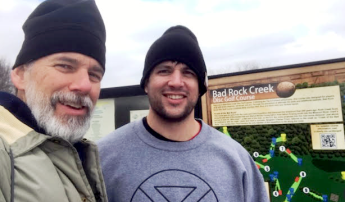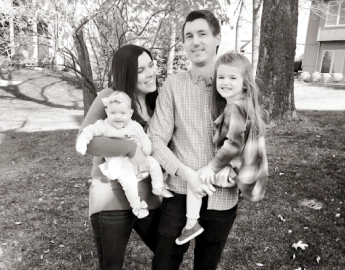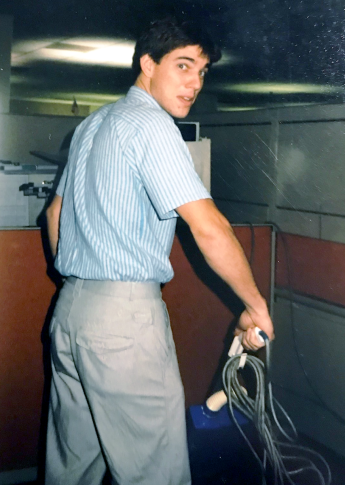Houston reps Region 6 on PBS Learning from our Legacy program
Cy Houston
cy.houston@gsa.gov
Public Buildings Service
Director of Facilities Management Division




Where are you from?
Kansas City, Missouri
Where do you live now?
Kansas City, Missouri
Tell us a little about yourself. Children? Pets? Married? Hobbies?
I am a Kansas Citian through and through — born, raised, educated (including college) in Kansas City. I met my wife Denise while in high school. She stuck with me all the way through college, and we have been married for 34 years.
We have two sons, one daughter, one son-in-law, and two granddaughters. Grandchildren truly are the best. Our family has always enjoyed outdoor activities including camping, hiking and traveling. For exercise and challenge, I enjoy hunting, fishing and disc golf.
What has been your career journey until now?
I have been with GSA for 34 years. I started as a GS-5 mechanical engineer intern and actually had a drafting board as part of my workstation. I performed mechanical design for the first three-ish years of my career; then transitioned into project management for the next several years. I have managed projects of all types, sizes and complexities and even had a brief stint as the regional energy coordinator.
I started my management career in 1997 as a branch chief responsible for project management and acquisition for half of the region’s BA54 program and select prospectus projects. I served as branch chief and project executive for eight years in multiple divisions before being promoted to director. For the last 15-plus years I have served as division director in three different divisions, served as acting regional commissioner for almost two years, 2012-2014, and have served as a senior advisor for almost two years.
During my career I have had the opportunity to work with and visit people in all 11 regions and have served on multiple central office teams. I have been blessed with amazing training opportunities and amazing job positions where I have been able to work with lots of great GSA employees all over the nation.
What is the Legacy program and how are you involved?
Learning from our Legacy (Legacy for short) is one of the many opportunities I have been afforded in my career. Legacy is a Public Buildings Service course that utilizes the case study method of teaching where the case studies are real-life GSA projects that GSA employees managed and learned lessons on what to avoid and what are considered best practices.
The first seminar was in 2000 in Scranton, Pennsylvania. I was blessed to attend the seminar, and I instantly fell in love with everything about Legacy. After the first seminar, the course sponsors were looking for regional people to serve on the Legacy team to help shepherd the course for the long term.
As a legacy team member, I contribute to deciding what case studies will be written and how the library of case studies will be grouped together for each session. The legacy team conducts periodic procurements for the course facilitator and continuously strives to ensure that the facilitation, case studies, and learning objectives remain relevant, fresh, and engaging for all participants.
The legacy team has evolved a lot over the last 20-plus years, and I am proud to be a part of a team that consistently serves up best in class training. Regional Project Manager Matt Meeks also serves on the team as a second Region 6 representative. The program is all about GSA projects, the real-life GSA teams who manage them, and how our projects serve our customers and stakeholders. We know the training is meeting its objectives, because we have participant feedback to prove it and a high percentage of repeat participants.
What have been the best parts about the Legacy program?
The best part of the Legacy program is getting to learn from project teams in all 11 regions and having the opportunity to hear first hand from the people who managed the projects. We have a lot of talented people across the regions, and Legacy gives all of us the opportunity to benefit from one another and to grow our network.
What does the Legacy program mean to you?
Legacy is unique in that it is training that is 100% tailored to GSA. It is based on our projects, our processes, our customers, and how our people approach delivering GSA projects.
Is there anything surprising about you or your work? If so, what?
I believe in giving back some of what I have been blessed with. During my entire career, I have served on boards and teams for various organizations in my community and in my church. One of my favorite ways to give back is teaching a fellowship group at church. I have 5 priorities I try to live by. In order of priority: Faith, Family, Friends, Fitness, and Finances (the 5 Fs).
Is there anything else you’d like to add?
I came to GSA right out of college. I grew up in a culture where the unspoken rule was that you demonstrated performance at the next grade level in order to be competitive for jobs at the next grade level. I always encourage people to work hard and learn as much of the transactional business of PBS as possible, including front-facing roles with our customers. Standing face to face with an unhappy judge is a great test of your knowledge, resilience, and professional maturity.

 U.S. General Services Administration
U.S. General Services Administration